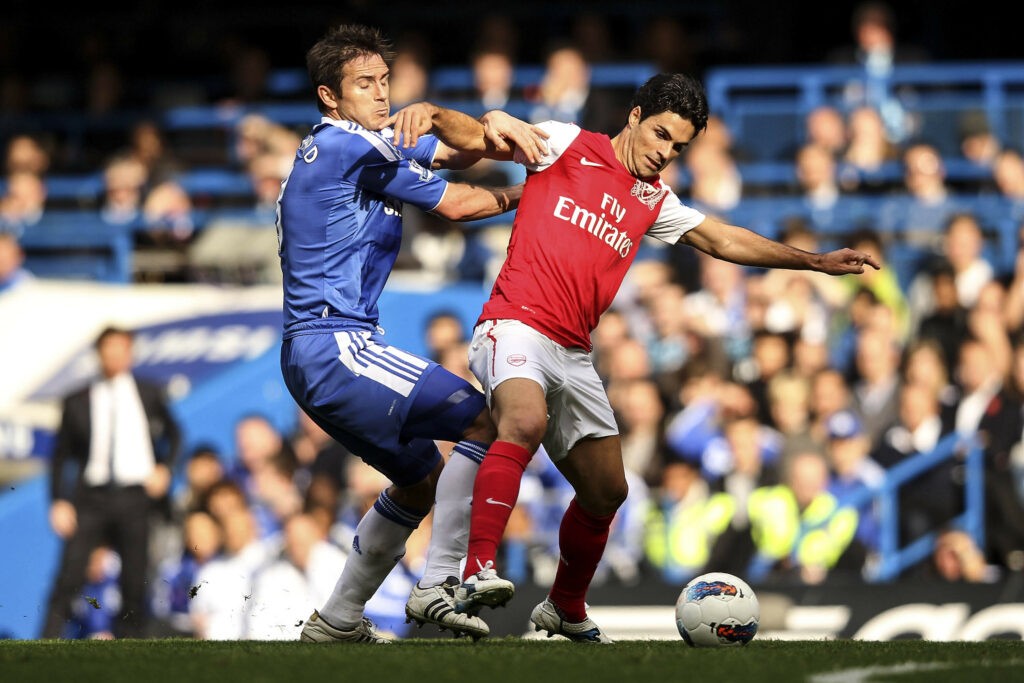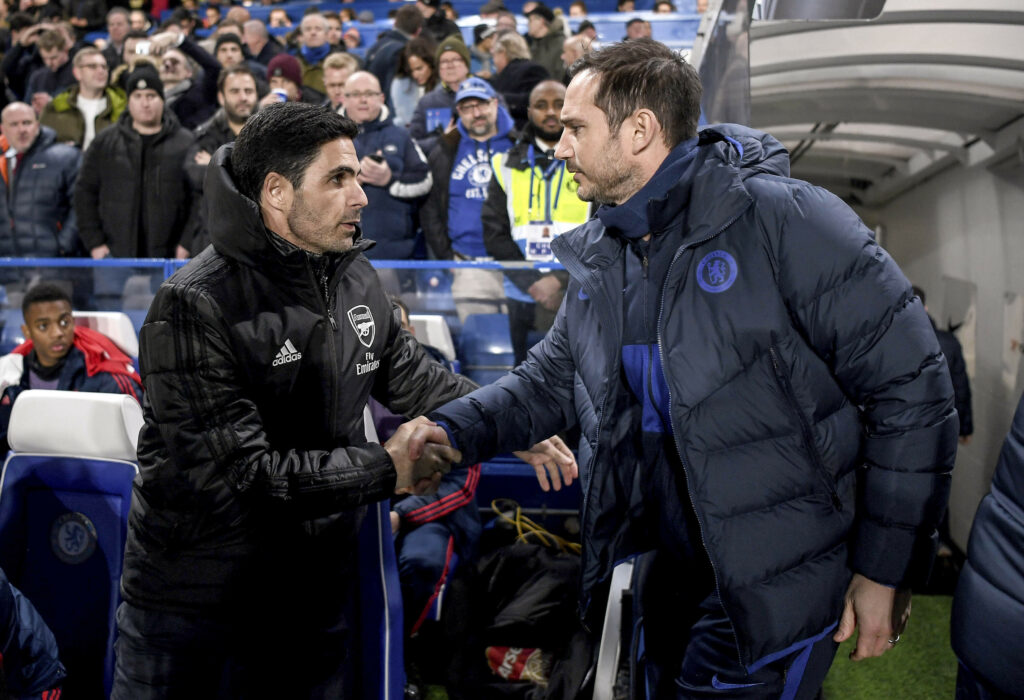Chelsea manager Frank Lampard (left) takes on Arsenal manager Mikel Arteta in the FA Cup final on Sunday. (Photo by Dan Mullan/Getty Images)
Chelsea have rather enjoyed the FA Cup during the Premier League era and victory over Arsenal on Saturday will bring their ninth title. The man at the beginning of their renaissance was dreadlocked Dutch maestro Ruud Gullit. He led the club in 1997, becoming the first foreign (read: non-British) and black manager to lift a major English trophy — a notable milestone in the zeitgeist of football’s present mode of reflection.
Yet, what’s truly eye-catching when looking at the achievement through a contemporary lens is that he did it as a player-manager, a role that quickly became extinct. There have since been recent sporadic sightings but nothing substantial — Garry Monk on an interim basis at Swansea, Ryan Giggs who substituted himself on for his final Manchester United appearance and Wayne Rooney, who took on coaching duties at Derby County from January. (That last one might surprise those who don’t think of Rooney as a particularly contemplative player. British satirist Charlie Brooker, for one, accused him of having the IQ of a “steak and ale pie”.)
As odd as the practice seems today — where a manager is expected to have sight of a multi-faceted global empire — there was nothing remarkable about a player-manager prior to the 21st century. It was fairly successful in some cases – Kenny Dalglish took Liverpool to a double in 1986 and, four years later, to what would be a last league title until 2020.
There’s an argument to be made that squads with a respected peer at the helm enjoyed a unique level of intimacy in the dressing room. It’s not a stretch to suggest that prosperity arrived because of – not in spite of – their leadership.
This is where we introduce Mikel Arteta and Frank Lampard. Neither are player-managers and both hung up their boots in 2016, but they are about as close to one as you could get these days. It’s also conceivable that in a parallel universe both of their clubs handed them the reins just a little earlier and the spotkick savants brought themselves on for a vital cup shootout.
 LONDON, ENGLAND – OCTOBER 29: Mikel Arteta of Arsenal battles for the ball with Frank Lampard of Chelsea during the Barclays Premier League match between Chelsea and Arsenal at Stamford Bridge on October 29, 2011 in London, England. (Photo by Ian Walton/Getty Images)
LONDON, ENGLAND – OCTOBER 29: Mikel Arteta of Arsenal battles for the ball with Frank Lampard of Chelsea during the Barclays Premier League match between Chelsea and Arsenal at Stamford Bridge on October 29, 2011 in London, England. (Photo by Ian Walton/Getty Images)
More importantly, their speculative appointments capture the ethos of promoting a stalwart to the top gig in the team. Both have sparse coaching CVs: Lampard had a sole year of full-time management experience at Derby in the championship while Arteta served as an assistant to Pep Guardiola at Manchester City. It’s clear that the bulk of their education came in their playing days; a collage of stolen mental notes taken while Jose Mourinho and Arsene Wenger, to name just two of their illustrious teachers, lectured their charges.
The result has been the seamless integration of two managers who know their clubs intimately and care about them deeply. The players have responded too; in a reality of overpaid superstars, it’s logical that a legend of recent memory would find respect easier to come by than a highfalutin scholar. Even the most impudent youngster would find it hard to talk back to a man he watched win a Champions League semifinal for his club mere days after the death of his mother.
Both reinforce this attitude by lacing up for every training session, demonstrating every movement and tactic — literally leading by example.
It’s paid off handsomely in the form of this weekend’s FA Cup final. Either Arteta or Lampard will punctuate their first foray into top-flight management with a major honour — a huge bonus in periods of transition for Chelsea and Arsenal. Much of their perceived success until this has been built on the fact they have had little to work with: the Blues with a transfer ban and Unai Emery leaving behind a mid-season shambles for his Spanish compatriot.
But their debuts have not been perfect and there is still much to prove. Lampard has learned a harsh lesson in pragmatism. Having ridden the initial wave of the enforced youth revolution, Chelsea began to falter a few months in and kept sliding. It was only after Lampard shifted his reliance to more experienced heads — Ross Barkley, Marcos Alonso and Olivier Giroud —– that the decline was reversed. It was telling that, by the vital final game of the Premier League last weekend, Mason Mount and Reece James were the only academy graduates in the starting line-up. The rest will have their moments but no longer at the expense of what makes best sense.
Arteta has struggled to inspire anything close to the consistency he displayed in his peak Evertonian form. Talented players like Alexandre Lacazette and Nicolas Pépé have too often been allowed to drift out of games. Others — Lucas Torreira and Dani Ceballos come to mind — sometimes seem to forget that they’re playing in a competitive football match and so end up losing the midfield. It speaks to poor concentration that is epitomised in every David Luiz clanger.
 LONDON, ENGLAND – JANUARY 21: Mikel Arteta, Manager of Arsenal shakes hands with Frank Lampard, Manager of Chelsea prior to the Premier League match between Chelsea FC and Arsenal FC at Stamford Bridge on January 21, 2020 in London, United Kingdom. (Photo by Darren Walsh/Chelsea FC via Getty Images)
LONDON, ENGLAND – JANUARY 21: Mikel Arteta, Manager of Arsenal shakes hands with Frank Lampard, Manager of Chelsea prior to the Premier League match between Chelsea FC and Arsenal FC at Stamford Bridge on January 21, 2020 in London, United Kingdom. (Photo by Darren Walsh/Chelsea FC via Getty Images)
What the London rivals have been able to do is save their best for the big occasions. This FA Cup final is one of the biggest so, despite two loosey-goosey defences on display, we might get a hesitant encounter with chances at a premium. Either way it will be a key learning experience for the young protagonists in the dugout and possibly the beginning of careers on the other side of the touchline. Elite Premier League clubs have been slow to risk promoting their longtime servants and could soon be proven wrong. Heck, we might even get a bonafide player-manager again.